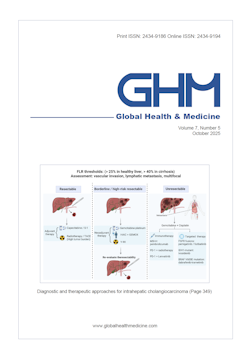Global Health & Medicine 2025;7(4):340-346.
Elevated risk of severe COVID-19 outcomes among underweight patients in Japan: A national registry-based study
Matsushita Y, Yokoyama T, Hayakawa K, Saito S, Matsunaga N, Terada M, Suzuki S, Morioka S, Kutsuna S, Hara H, Kimura A, Ohmagari N
We conducted a study to determine the impact of body mass index (BMI) (underweight, normal weight, and overweight) on the severity of COVID-19 across different periods of variant predominance using a large-scale data registry of hospitalized COVID-19 patients in Japan (COVIREGI-JP), involving 46,291 Japanese patients aged 20–89 years. Severity was classified based on the most intensive treatment received throughout the hospitalization. Multiple logistic models were used to assess the risk of severe disease, and adjusted odds ratios (ORs) for BMI < 18.5, 18.5–20, and ≥ 25 relative to BMI of 20.1–24.9 were calculated by sex and age group. The risk of severe COVID-19 and death was high among those with BMI < 18.5 [OR (95% CI): 1.88 (1.52–2.33), 1.59 (1.22–2.07)] as well as those with BMI ≥ 25 [1.38 (1.20–1.60), 1.87 (1.50–2.34)] for both men and women, respectively. The risk was extremely high among those with BMI < 18.5 when the Omicron variant was predominant [2.41 (1.66–3.49) for men, 2.96 (1.77–4.97) for women]. An important point to note is that being underweight as well as obesity increased the risk of severe COVID-19 and death. More attention should be paid to underweight individuals when predicting COVID-19 risk.
DOI: 10.35772/ghm.2025.01057







